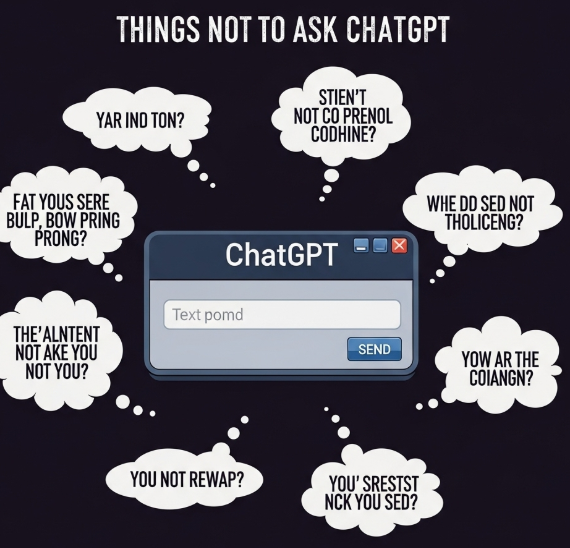One of the most widely used AI tools, ChatGPT has also guided millions worldwide — from homework to business strategies. However, just like any powerful technology, it comes with limits and boundaries that one needs to understand. It doesn’t stop there. So now we know what not to ask ChatGPT, but this is really about making sure you are using the tool in a safe, effective and responsible way.
Let us explore these questions and requests in this all-inclusive guide for ChatGPT. This knowledge will enable you to get the most out of your AI interactions while also staying safe and ethical, whether you are a student, professional or casual user.
Why AI Boundaries Matter
First, let’s take a step back and look at why these limitations are in place. AI chatbots, such as ChatGPT, have safeguards protections and ethical guidelines in place to ensure user/societal safety. These limits are in place to prevent abuse, guard privacy, and ensure that this technology is channeled toward good.
These restrictions have been implemented by the developers of ChatGPT, after extensive research and real-world testing taking into consideration the ethical implications. Yes, some restrictions can be irksome, but they’re in place for a reason and they keep things civil across the board.
Medical and Health Advice That You Should NEVER ASK
Personal Medical Diagnoses
One of the most dangerous areas to avoid – asking ChatGPT to provide specific medical diagnoses. Here’s what you should not ask:
- “I have these symptoms… What disease do I possibly have?”
- “Can I avoid my doctor and now use this as an excuse to get off that medicine I was prescribed?”
- “Is this rash cancerous?”
- “Do I have depression?”
Why Medical Questions Are Problematic
ChatGPT cannot:
- Examine you physically
- Review your medical history
- Order diagnostic tests
- Consider your unique health circumstances
- Replace professional medical training
Safe Health-Related Alternatives
Rather than asking for diagnoses, you can:
- Ask for overview of health topics
- Inquire about medical terms
- Get suggested questions to ask your doctor
- Learn about healthy lifestyle habits
Legal Advice and Law-Related Restrictions
Specific Legal Counsel
Never use ChatGPT as your lawyer. Do not ask these sorts of legal questions:
- “Is this a wrongful termination lawsuit?”
- “How do I hide assets in a divorce?”
- “What is the best way to not pay taxes?”
- “Can you draft a valid will?”
Legal Information vs Legal Advice
There’s a crucial difference between:
Legal Information:
- General explanation of laws
- How the court system works
- Common legal terms
- Basic legal concepts
Legal Advice:
- Specific recommendations
- What you should do in your situation
- Case-specific guidance
- Professional counsel
Better Legal Approaches
- Request broad principles or concepts of law
- Request help finding legal resources
- Help organizing questions for an actual lawyer
- Keep it generalized when discussing legal topics
Financial and Investment Guidance Restrictions
Personal Financial Planning
ChatGPT should never give individualized financial guidance, such as where to invest, or answer questions regarding your specific financial circumstances because it cannot assess:
- Your complete financial situation
- Your risk tolerance
- Market conditions in real-time
- Your specific goals and timeline
Dangerous Financial Questions to Avoid
- “Should I empty out my life savings to buy cryptocurrency?”
- “What stocks should I buy now?”
- “How can I get rich quick?”
- “Should I borrow money to invest?”
Smart Financial Alternatives
- Query basic financial concepts
- Request help creating budgeting templates
- Learn about different investment types
- Ask about financial literacy resources
Privacy and Personal Information Concerns
Your Personal Data
Things to never share with ChatGPT:
- Social Security numbers
- Credit card information
- Bank account details
- Passwords or login credentials
- Home addresses
- Phone numbers
- Email passwords
Other People’s Private Information
Just as important is protecting the privacy of others:
- Don’t share friends’ personal details
- Avoid discussing confidential work information
- Don’t share family secrets
- Don’t post private messages or screenshots
Data Security Best Practices
- Keep sensitive information offline
- Use general examples instead of real data
- Create fictional scenarios for practice
- Remember that AI chats can be saved
Academic Integrity and Homework Limitations
Direct Homework Completion
Though ChatGPT can be a wonderful learning resource, it must never replace your work:
What Not to Ask:
- “Finish my Romeo and Juliet essay”
- “Give me answers to my math homework!”
- “Do this assignment for my history class”
- “Write my thesis statement and conclusion”
Better Academic Approaches
- Help me understand this concept
- Discuss essay topics with me
- Explain how to approach this type of problem
- Suggest research resources
Plagiarism Concerns
Using ChatGPT responses without proper citation can lead to:
- Academic penalties
- Failing grades
- Disciplinary action
- Damage to your reputation
Learning-Focused Questions
Turn demands into lessons:
| Instead of This | Try This |
| Write my book report | Help me outline the main themes in this book |
| Solve these equations | Explain how to approach this type of problem |
| Give me essay answers | Help me understand the key points I should address |
Illegal Activities and Harmful Content
Criminal Activity Guidance
ChatGPT should not and will not help with:
- How to commit crimes
- Ways to harm others
- Illegal drug manufacturing
- Weapons creation
- Fraud schemes
- Hacking techniques
Harmful Content Creation
Avoid requests for content that:
- Promotes violence or hate
- Targets specific individuals negatively
- Contains explicit sexual material
- Encourages self-harm
- Spreads misinformation
Ethical Alternatives
- Ask about conflict resolution strategies
- Request information about legal alternatives
- Get assistance with creating positive content
- Learn about ethical decision-making frameworks

Technical and Professional Service Limitations
Complex Technical Implementations
Although it can clarify concepts and offer general direction, ChatGPT is not a substitute for:
Professional Services:
- Software debugging of critical systems
- Network security implementations
- Database architecture for important projects
- System administration tasks
Why Technical Limits Exist
- AI cannot test in real environments
- Complex systems require human expertise
- Safety-critical applications need professional oversight
- Debugging requires interactive problem-solving
Better Technical Approaches
- Use ChatGPT for learning concepts
- Ask about core coding principles
- Request explanations of technical terms
- Ask for standards and best practices guidance
Current Events and Real-Time Information
Time-Sensitive Information
ChatGPT has a knowledge cutoff date and therefore is not always reliable for:
- Current news events
- Real-time stock prices
- Weather forecasts
- Sports scores and schedules
- Political developments
- Breaking news analysis
Information Currency Issues
The AI cannot provide:
- Today’s election results
- Current celebrity news
- Recent scientific discoveries
- Latest policy changes
- Up-to-date statistics
Reliable Information Sources
For current information, consult:
- News websites and apps
- Official government sources
- Financial market platforms
- Weather services
- Real-time data providers
Creative Limitations and Copyright Issues
Copyrighted Content Reproduction
Never ask ChatGPT to:
- Copy entire songs, books or articles
- Create content that violates copyright
- Reproduce protected creative works
- Create copies of existing material
Original vs. Derivative Content
| Good Requests | Bad Requests |
| Brainstorming ideas for stories | Rewriting Harry Potter with a twist |
| Structures for poems | Copying lyrics from famous songs |
| Writing style explanations | Generating content identical to copyrighted work |
Creative Best Practices
- Focus on original content creation
- Use AI for inspiration, not copying
- Understand fair use principles
- Respect intellectual property rights
Relationships and Personal Advice Limitations
Complex Relationship Counseling
ChatGPT might provide general relationship awareness, but it cannot replace proper counseling for:
Serious Relationship Issues:
- Marriage counseling needs
- Family therapy situations
- Abuse or domestic violence
- Severe communication problems
- Trust and infidelity issues
Mental Health Concerns:
- Depression and anxiety treatment
- Trauma processing
- Addiction recovery
- Crisis intervention
- Medication management
Appropriate Relationship Questions
ChatGPT can help with:
- General communication tips
- Conflict resolution strategies
- Relationship building ideas
- Self-reflection prompts
- Educational resources about relationships
Business and Entrepreneurship Restrictions
Specific Business Decisions
Do not ask ChatGPT for critical business decisions like:
- “Should I fire this employee?”
- “How should I price my product?”
- “Should I partner with this business?”
- “What portion of budget should go to marketing?”
Market Analysis Limitations
ChatGPT cannot provide:
- Real-time market data
- Specific investment recommendations
- Competitive intelligence on particular companies
- Insider business information
- Guaranteed success strategies
Business Planning Support
Better business-related requests include:
- General business planning frameworks
- Marketing strategy concepts
- Financial planning templates
- Communication best practices
- Industry research methods
Tips for Using ChatGPT Safely and Effectively
Maximizing Your AI Experience
Here’s how to get the best out of ChatGPT while staying within bounds:
Do These Things:
- Seek understanding instead of just answers
- Research diverse views on complex subjects
- Use it as a brainstorming partner
- Leverage it as a learning organizer
- Explore new ideas and subjects
Avoid These Approaches:
- Relying on it for professional expertise
- Sharing sensitive personal information
- Expecting real-time or current information
- Using it as a replacement for human professionals
- Requesting advice on harmful or illegal behavior
Building Better Prompts
Create more effective interactions by:
- Being specific about your needs
- Providing context for your questions
- Asking for sources and verification
- Requesting step-by-step explanations
- Knowing when to be specific vs. general
Red Flags: When to Stop and Get Real Help
Recognize These Warning Signs
Stop using ChatGPT and consult with professionals when dealing with:
Health and Safety Issues:
- Medical emergencies or serious symptoms
- Mental health crises
- Safety concerns or dangerous situations
- Legal troubles or potential lawsuits
Professional Needs:
- Complex technical problems affecting your work
- High-impact business decisions
- Situations requiring licensing or certification
- Legal compliance issues
Personal Situations:
- Relationship crises or family emergencies
- Significant financial difficulties
- Educational problems affecting your future
- Ethical dilemmas with serious consequences
Finding the Right Human Experts
When you need professional help, consult:
- Licensed medical providers
- Professional financial advisors
- Licensed attorneys for legal questions
- Therapists for relationship and mental health issues
- Technical and business consultants
Leveraging AI Within Bounds
Productive AI Interactions
Despite its limitations, ChatGPT is still helpful for:
Learning and Education:
- Explaining complex topics
- Providing examples of difficult concepts
- Creating study materials
- Suggesting research directions
Creative Projects:
- Brainstorming ideas and concepts
- Developing creative writing exercises
- Exploring different artistic approaches
- Generating inspiration for original work
Professional Development:
- Improving communication skills
- Exploring industry trends and concepts
- Developing presentation ideas
- Practicing interview scenarios
Personal Growth:
- Exploring new hobbies and interests
- Setting and organizing personal goals
- Learning time management techniques
- Developing problem-solving skills
The Future of AI Assistance
As AI technology evolves, the capabilities and limits of tools like ChatGPT are expected to change as well. But the underlying principles of responsible use will remain:
- Respect for privacy and safety
- Ethical considerations in all interactions
- Recognition of AI limitations
- Valuing human judgment and expertise
Conclusion: Use AI Smart for Awesome Results
When a tool as powerful as ChatGPT is at our disposal, it can help us improve learning and creativity or even make our work life more exciting. Knowing what not to ask allows you to focus on its strengths, while avoiding potential pitfalls and dangers.
Remember, the goal is not to avoid using ChatGPT altogether but to use it responsibly. The constraints listed above are not impediments to AI — rather they serve as guide rails for productive, safe, and ethical interactions with AI. Respecting these boundaries creates a healthy relationship with AI technology that supports you without compromising your values or safety.
Ultimately, we should view tools like ChatGPT not as replacements for human expertise but as assistants. Use them to enhance your skills, facilitate your learning and help explore new creative possibilities. But also know that for the most important decisions in life — health, legal, relationships and safety — human wisdom, training and judgment are irreplaceable.
As AI continues to evolve and become more pervasive, you will be better able to take advantage of the technology while steering away from potentially damaging consequences. Continue to be curious about the world of AI and its fascinating realm that builds a foundation for a future in which everyone has a key role in keeping it safe.
FAQ
1. Why does ChatGPT have boundaries and restrictions?
ChatGPT has safeguards and ethical guidelines to ensure safety, prevent abuse, and protect privacy. These restrictions are designed by developers after research and testing to encourage responsible and civil use of AI.
2. Can ChatGPT provide medical diagnoses or health advice?
No, ChatGPT cannot replace doctors. It cannot examine you, review medical history, or order tests. Instead, it can explain health topics, clarify medical terms, suggest healthy habits, or help prepare questions for your doctor.
3. Is ChatGPT a substitute for legal or financial advice?
No. ChatGPT cannot act as your lawyer or financial advisor. It cannot provide specific case-based legal guidance or personal investment recommendations. However, it can explain laws, financial concepts, and offer general educational resources.
4. What personal information should never be shared with ChatGPT?
You should avoid sharing sensitive details like Social Security numbers, credit card data, passwords, addresses, or others’ private information. Always keep confidential data offline for security.
5. Can students use ChatGPT for homework and assignments?
Students should not ask ChatGPT to complete essays, assignments, or exams. Instead, it can explain concepts, suggest resources, outline key points, and help with brainstorming, while avoiding plagiarism and academic penalties.











